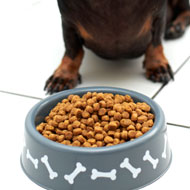
Researchers may be able to delay age-related disease in dogs and humans
US scientists say a drug added to pet food may be able to extend dogs' lives by two to five years. It is hoped their research may also have implications for human medicine, reducing the prevalence of age-related heart problems, cancer and other illnesses.
Led by Matt Kaeberlein and Daniel Promislow, researchers from the University of Washington (UW) are embarking on a five-year study titled the Dog Ageing Project.
In a two-part trial, low doses of the anti-rejection drug rapamycin, which is used in human medicine, will be added to the diets of middle age pet dogs (aged six to nine depending on breed).
Before, during and after the trials, researchers will monitor age-related factors such as heart function, immune function, activity levels, body weight and cognitive functions. The dogs will be tracked throughout their lives to determine the impact on lifespan and health.
Previous research indicates that low doses of rapamycin has the ability to extend life and delay age-related diseases in mice and other organisms.
High doses of the drug are used in human patients to prevent the rejection of organ transplants and to fight cancer. Washington researchers say that in middle-age mice, providing low doses in the diet delay age-related heart dysfunction, cancer, immune decline and cognitive decline.
Scientists believe the drug could increase healthy lifespan in dogs by two to five years or more, as well as improving cardiac and immune function and delaying, or reducing the risk of, cancer.
Similar studies in humans can take decades, but it is hoped that in less than 10 years, the UW team can uncover key factors that may help pets stay healthy for longer.
To find out more about the research, visit dogagingproject.com or www.uwhealthyaging.org/#!dog-aging/c13h0.



 RCVS Knowledge has welcomed Professor Peter Cockcroft as editor-in-chief for Veterinary Evidence.
RCVS Knowledge has welcomed Professor Peter Cockcroft as editor-in-chief for Veterinary Evidence.